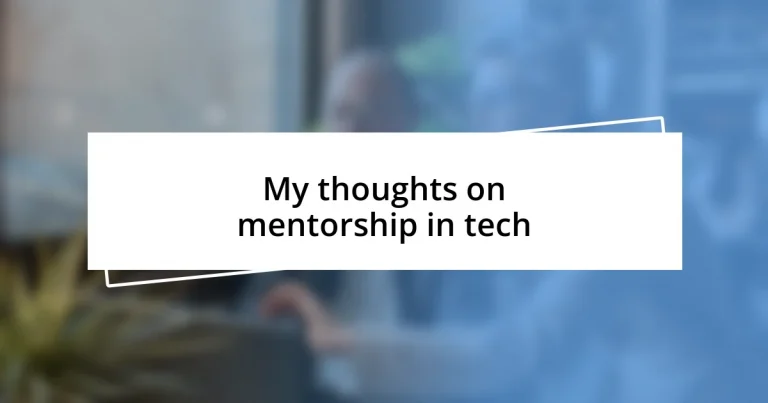Key takeaways:
- Mentorship in tech fosters personal growth, accelerates professional development, and provides a supportive community, transforming uncertainty into clarity.
- Choosing the right mentor involves aligning expertise, communication styles, and values to cultivate a productive relationship.
- Effective communication and clear goal-setting are essential to overcoming common mentorship challenges and measuring success through both skills and personal development.
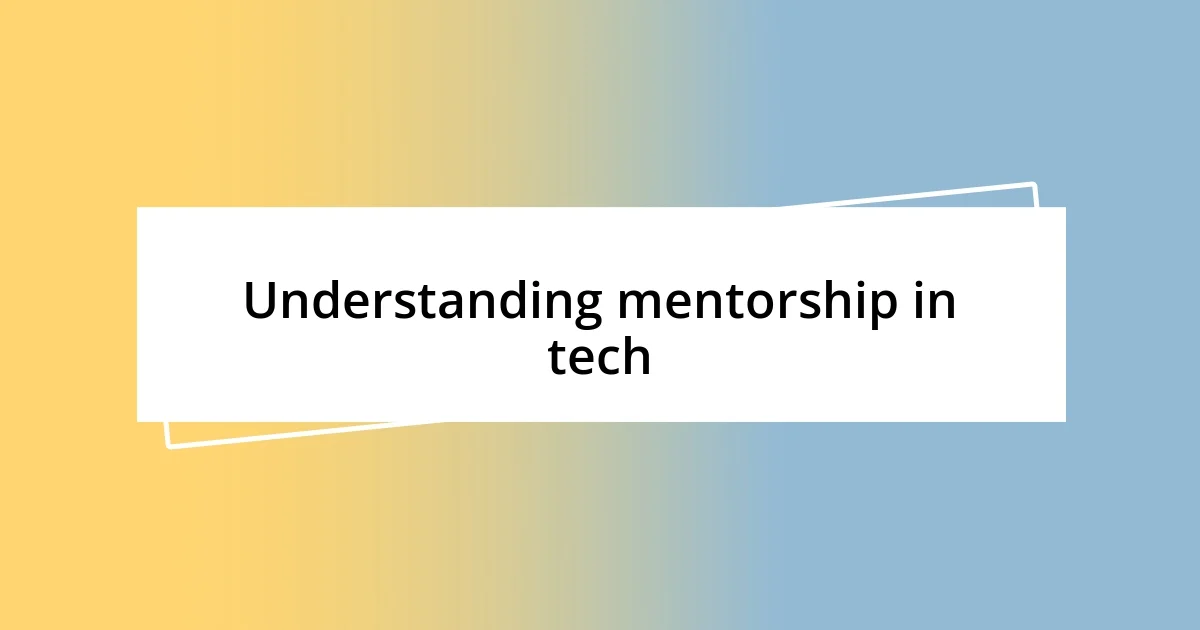
Understanding mentorship in tech
Mentorship in tech is a dynamic relationship that goes beyond simple guidance; it’s about connection and growth. I remember my first mentor, who didn’t just point me towards resources but took the time to understand my aspirations and concerns. Have you ever felt lost in your career path? That personal touch can transform uncertainty into clarity.
The rapid evolution of technology means that mentorship is more essential than ever. I’ve seen firsthand how a mentor’s experience can shorten my learning curve and boost my confidence. It’s like having a GPS in a constantly shifting landscape; without that direction, it’s easy to feel overwhelmed.
Moreover, mentorship in tech often fosters a sense of community and belonging. I’ve found that opening up about my challenges not only deepens the mentor-mentee bond but also encourages others to share their experiences. Isn’t it empowering to realize that we can lift each other up in this journey?

Benefits of mentorship relationships
Building on the concept of mentorship, it’s clear that one of the most significant benefits is the acceleration of professional development. I recall a moment when my mentor helped me tackle a complex project. With their guidance, I not only completed it on time but also gained skills that I still rely on today. That kind of support is invaluable in navigating the tech landscape.
Mentorship relationships also provide unique networking opportunities. During my early career, a mentor introduced me to key industry contacts, which opened doors I didn’t even know existed. Imagine the possibilities when someone who believes in you connects you with their network; it’s like gaining access to a hidden treasure chest.
Additionally, the emotional support that comes from having a mentor cannot be overstated. I often had moments of self-doubt, questioning my capabilities in such a competitive field. What helped me the most was my mentor’s unwavering belief in my potential. Just knowing there was someone rooting for my success made all the difference.
| Benefit | Description |
|---|---|
| Accelerated Development | Guidance that helps shorten learning curves and enhances skills. |
| Networking Opportunities | Introductions to key industry contacts that can lead to career advancements. |
| Emotional Support | Encouragement and belief in potential that boosts confidence. |
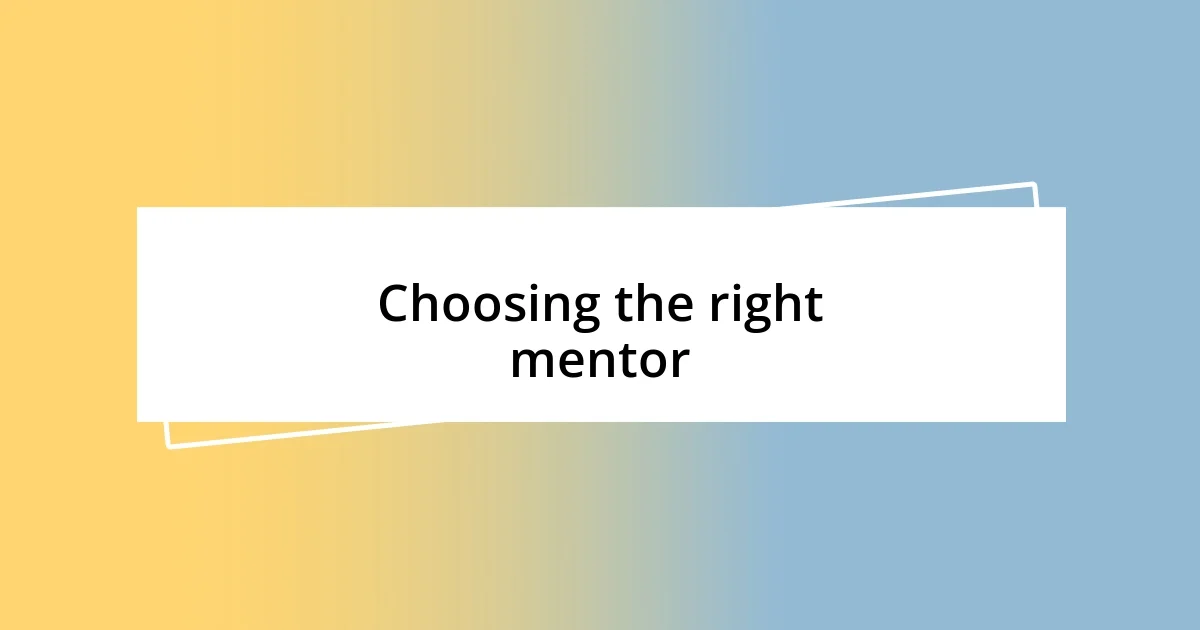
Choosing the right mentor
Choosing the right mentor can feel like navigating a maze. I remember the time I had to decide between a mentor with a strong technical background and one with extensive industry connections. Both had their strengths, but I realized I needed someone who not only understood the technical side but also shared my career vision. It’s crucial to align your goals with your mentor’s expertise to foster a productive relationship.
Here’s what to consider when selecting a mentor:
- Expertise Match: Look for someone with experience in the specific area you want to grow.
- Communication Style: Ensure their way of providing feedback resonates with you—supportive yet challenging.
- Availability: A mentor who has time for regular check-ins will provide consistent guidance.
- Shared Values: Seek someone whose values align with yours; this builds trust and rapport.
- Diverse Perspectives: Don’t shy away from mentors with different backgrounds—varied insights can spark creativity and innovation.
Remember, the right mentor should not only guide you but also inspire you to reach new heights in your tech journey.

Building effective communication
Effective communication is the cornerstone of any successful mentorship. I vividly recall an instance when my mentor and I had a candid conversation about my career aspirations. That dialogue not only clarified my goals but also reinforced my confidence. Isn’t it amazing how a few honest words can light the way forward?
Another key aspect is the ability to give and receive constructive feedback. I’ve learned that when mentors provide guidance, it’s essential to approach it with an open mind. There was a time when I received suggestions that challenged my way of thinking. Initially, it felt uncomfortable, but reflecting on that feedback ultimately strengthened my skillset—just like tuning an instrument brings out its true harmony.
Lastly, fostering an atmosphere of trust is crucial. I remember discussing mistakes I’ve made openly with my mentor, which created a safe space for both of us. This openness not only made our relationship stronger but also encouraged a continual learning mindset. So, have you thought about how your communication style can impact your mentorship relationships? It’s worth pondering, as good communication could truly transform that dynamic.
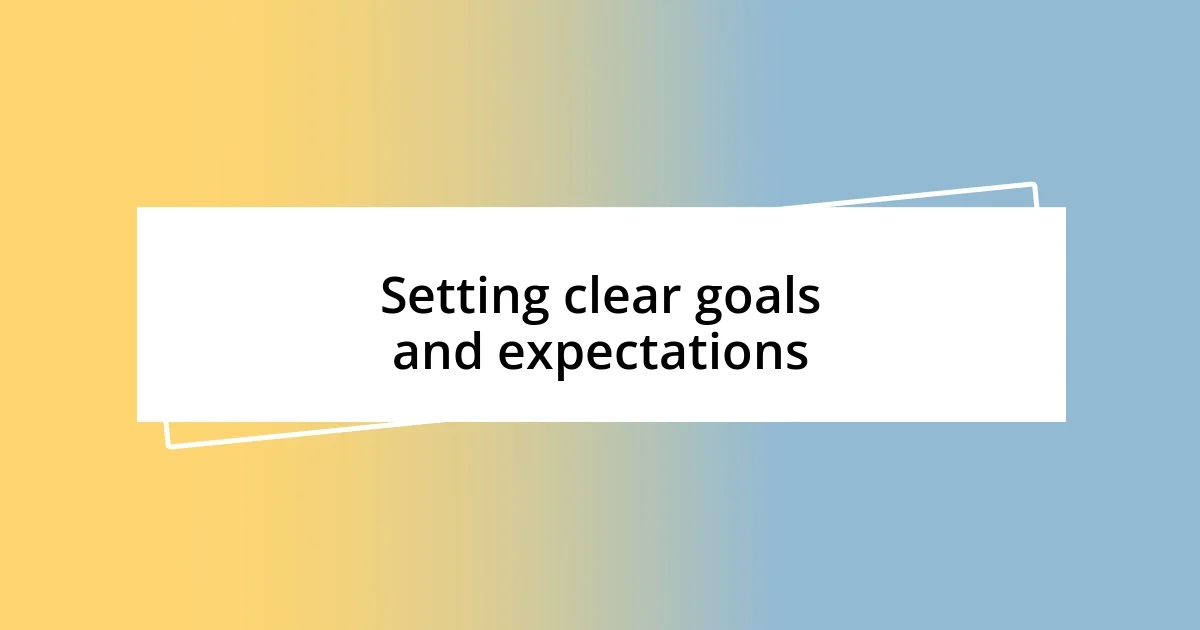
Setting clear goals and expectations
Setting clear goals and expectations is fundamental in any mentorship relationship. I remember my first mentoring experience, where we established specific milestones for my skill development. Each goal we set became a stepping stone that kept me motivated and focused. Have you ever felt lost without direction? That’s exactly how I felt before we aligned our objectives.
When both the mentor and mentee understand the desired outcomes, it creates a framework for accountability. I found it incredibly helpful to draft a shared document outlining our goals, which we revisited regularly. This practice made it easier to measure progress and adjust our approach as needed. How do you track your growth in mentoring situations? Having tangible benchmarks can make the journey less daunting.
Moreover, the importance of regular check-ins cannot be overstated. In one of my experiences, we dedicated a brief time each month to evaluate my progress and recalibrate our plans. It was during those sessions that I realized my initial goals often required tweaking, as my understanding deepened. Does the idea of re-evaluating goals resonate with you? Embracing flexibility can be a game-changer in maximizing the benefits of mentorship.
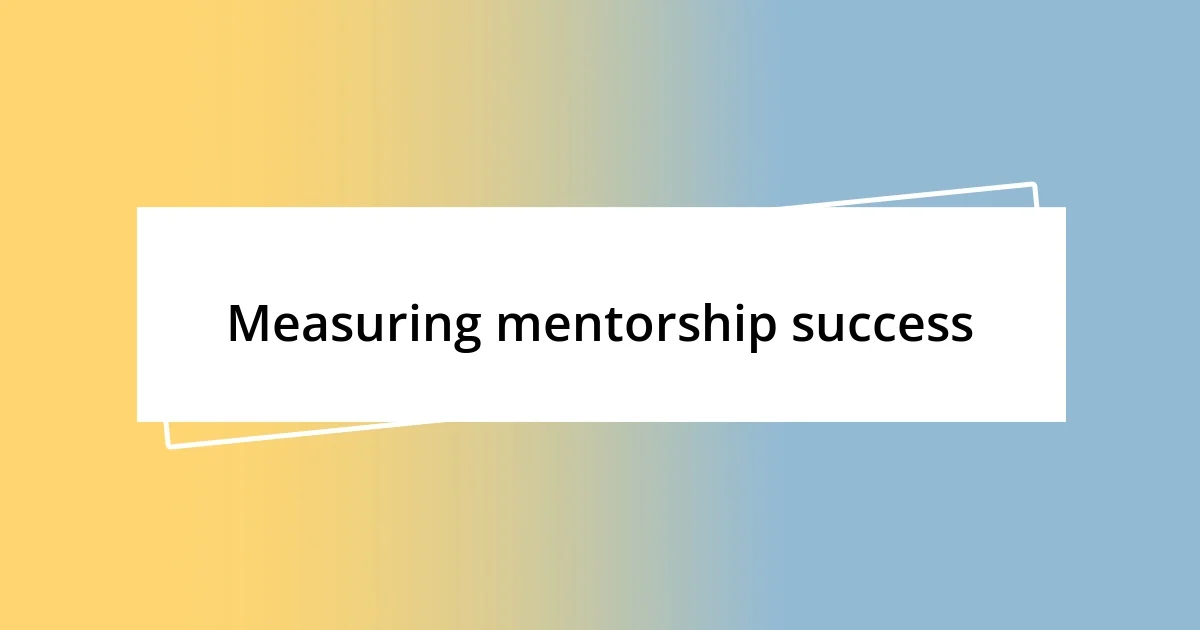
Measuring mentorship success
Measuring mentorship success can be a nuanced process, but one effective way I’ve found is to track specific outcomes over time. In my own mentorship experience, I made it a habit to document my learning journey — from new skills acquired to projects completed. Reflecting on those achievements not only highlighted my growth but also reminded me of how far I’d come. Have you ever kept a progress diary? It’s a powerful tool for self-reflection.
Another aspect I’ve considered is feedback from peers and supervisors. Early in my career, I received unsolicited praise for improvements in my technical skills, which I later realized stemmed from the insights shared by my mentor. This external validation acted as a tangible measure of the mentorship’s impact. How often do you seek feedback from those around you? It can be so enlightening to see how others perceive the progress you’ve made.
Lastly, I believe that success isn’t just about measurable skills; it’s also about personal development. The confidence I gained through my mentorship journey translated into my ability to tackle new challenges head-on. I remember walking into a meeting, ready to present ideas I once thought were too ambitious. Have you experienced that exhilarating rush of confidence sparked by someone’s belief in you? Understanding the emotional shifts is crucial when gauging the true success of a mentorship relationship.
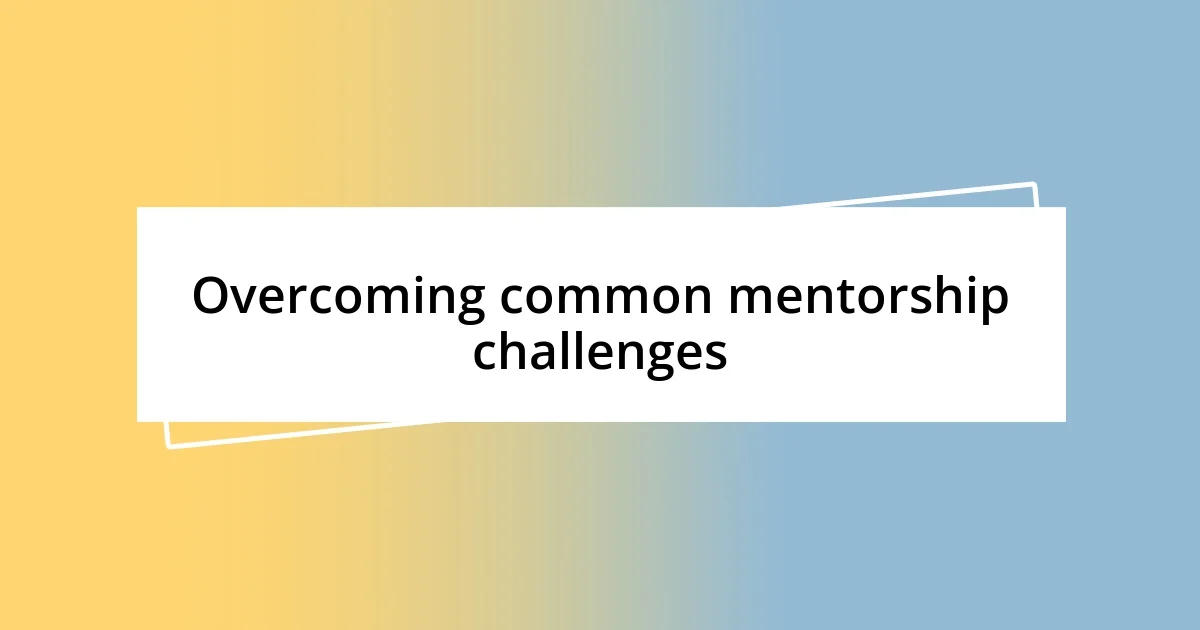
Overcoming common mentorship challenges
It’s no secret that navigating the mentor-mentee relationship can sometimes feel tricky. One common challenge I’ve faced is the mismatch in communication styles. For instance, I once worked with a mentor who loved diving deep into technical jargon. Initially, I felt overwhelmed and hesitant to ask questions. Have you ever felt that way? It turned out that by simply voicing my need for clearer explanations, we could adjust our dialogues, making our sessions far more productive and enjoyable.
Another hurdle is time management. I remember juggling multiple projects while trying to fit in mentor meetings. It felt like a race against the clock. To combat this, I suggested structuring our sessions around my schedule, focusing on prioritizing the most relevant topics. Have you ever had to negotiate time with a mentor? By being open about my constraints, I fostered a more respectful and understanding relationship, making the most of our limited time together.
Finally, dealing with divergent expectations can create friction. In one instance, I assumed my mentor wanted me to follow a traditional path, but when I expressed my desire to explore unconventional projects, it led to a breakthrough. Have you ever had a moment of realization that changed your direction? By encouraging honest conversations about our expectations—laying out what we both wanted—I discovered that the mentorship was not just about skill-building but also about nurturing creativity and exploration. It’s these candid exchanges that can turn challenges into opportunities.











